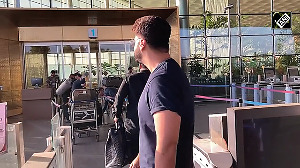Small independent agencies in India are slowly but steadily making inroads into large advertiser accounts held by industry majors. Creative duo Manish Bhatt and Raghu Bhat of Mumbai-based creative hotshop Scarecrow are working on the launch of a new brand for Nestle. "We are not in a position to disclose," says Bhatt, "But suffices to say it is important for the company."
Creative duo Manish Bhatt and Raghu Bhat of Mumbai-based creative hotshop Scarecrow are working on the launch of a new brand for Nestle. "We are not in a position to disclose," says Bhatt, "But suffices to say it is important for the company."
Another Mumbai-based creative agency Taproot co-founders Agnello Dias and Santosh Padhi are hopeful of bagging more work from beverage major Pepsi following their successful "Change the Game" campaign during the Cricket World Cup earlier this year.
"We are likely to get more assignments in the current financial year," says Dias.
Yet another creative firm Law & Kenneth is excited about walking away with the corporate account of the Hero group recently.
Law & Kenneth is now part of the group of agencies that does advertising work for Hero.
Creative hotshops, mostly small independent agencies that depend on their creative output to make a mark, are slowly but steadily making inroads into large advertiser accounts held by industry majors.
According to Bhatt, the driving force behind the trend is the need for a fresh perspective.
"Advertisers quite often look for fresh thinking. That's what drives them to award a business or a campaign to an agency outside its roster of agencies."
His view was endorsed by the advertisers. A Pepsi executive, for instance, admits that it was fresh thinking that led the company to award its coveted World Cup Cricket campaign to Taproot.
Nestle officials voiced similar sentiments regarding the firm's decision to consider Scarecrow. "A fresh perspective always helps," says a company executive, requesting anonymity.
How long will the trend last?
Small agencies believe the trend is here to stay. "There is enough business in the market," says Sajan Raj Kurup, founder and creative chairman, Creativeland Asia.
"This has become a way of life." For instance, when Creativeland Asia was given the advertising mandate for Audi's A8 launch last year, little did it know that the luxury car maker would consolidate all its brands.
But this year Audi did exactly that to get all brands under one agency.
Kurup says it was the question of a younger mindset versus an older one when deciding on an agency.
"I don't think it is a question of size. Agencies founded in today's time are better equipped to handle the challenges that confront a brand today. Their outlook is contemporary which helps an advertiser decide in its favour. It has nothing to do with how big or small an agency is."
But others beg to differ. "Small agencies take every piece of business very seriously. That's not to say that the large ones don't. The point is that the larger ones have so much on their hands that at times the new brand may get lost.
At times, the people working on the brand in a large agency may not be empowered enough to take decisions quickly, which is not the case with smaller agencies.
The turnaround time is faster in a small agency because they are keen to prove themselves by doing good work. All of this counts," says Bhatt of Scarecrow.
What are the big boys saying?
But heads of large agencies say the rise of creative hotshops is nothing more than a fad.
Says Colvyn Harris, chief executive officer, JWT: "These agencies are called on a project basis. Their role is limited in a sense. That is because these agencies are not in a position to bring the perspective and resources that a large agency can.
The category understanding, knowledge and research that large agencies bring to a brand is something that small agencies are not in a position to offer. To me this is a romantic holiday which won't last long."
Says Prasoon Joshi, executive chairman, McCann Worldgroup India: "I find nothing unusual with the emergence of small agencies. They have always existed not just in India, but also abroad. And there are takers for their work, which is why they exist."
Some popular independent creative hotshops that exist internationally, include, Strawberry Frog, Naked and Wieden & Kennedy.
"For most of modern advertising's history, creative people who have wanted to work independently and do the kind of work they wish have broken away from larger agencies of which they have been a part to fulfill this dream. I find nothing new with this. Both the big and small agencies can co-exist," says Joshi.










